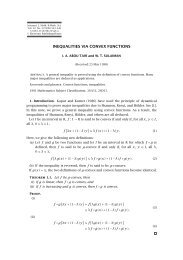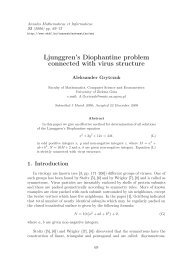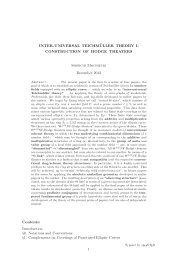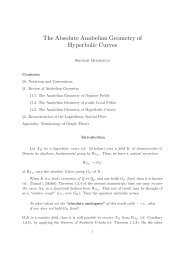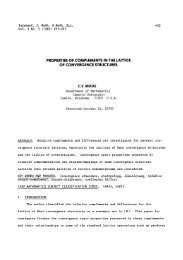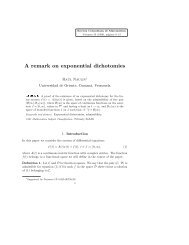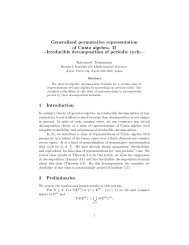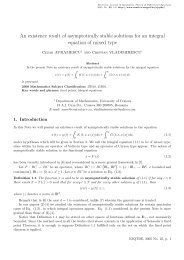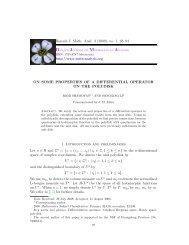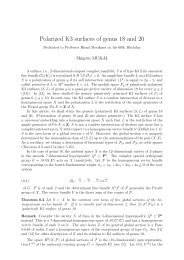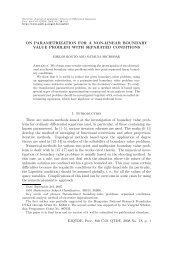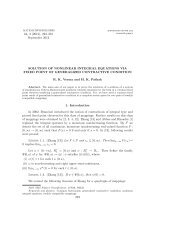CHILDREN'S CONCEPTUAL UNDERSTANDING OF COUNTING
CHILDREN'S CONCEPTUAL UNDERSTANDING OF COUNTING
CHILDREN'S CONCEPTUAL UNDERSTANDING OF COUNTING
Create successful ePaper yourself
Turn your PDF publications into a flip-book with our unique Google optimized e-Paper software.
CHILDREN’S <strong>CONCEPTUAL</strong> <strong>UNDERSTANDING</strong> <strong>OF</strong> <strong>COUNTING</strong><br />
<br />
<br />
<br />
This paper describes a design research study with ten second-grade students who are<br />
part of the Measure Up (MU) research and development project underway at the<br />
University of Hawai‘i. Students were asked how they counted in multiple bases,<br />
specifically how they knew when to go to a new place value and why it was necessary<br />
to do so. All ten students showed skillfulness in counting and representing the<br />
numbers, but analysis of their responses showed different levels of generalization of<br />
method and explanation of underlying ideas.<br />
INTRODUCTION<br />
<br />
<br />
<br />
<br />
<br />
<br />
<br />
<br />
Theoretical Foundation of Measure Up and Counting<br />
<br />
<br />
<br />
<br />
<br />
<br />
<br />
<br />
<br />
<br />
<br />
<br />
<br />
<br />
<br />
<br />
<br />
<br />
Proceedings of the 28th Conference of the International<br />
Group for the Psychology of Mathematics Education, 2004 Vol 4 pp 209–216
GL<br />
GLL<br />
G<br />
<br />
<br />
<br />
BTTBBTT<br />
B<br />
<br />
<br />
<br />
<br />
<br />
<br />
<br />
<br />
<br />
before<br />
<br />
<br />
<br />
4–210 PME28 – 2004
FB<br />
E<br />
F<br />
F<br />
<br />
<br />
B<br />
E<br />
BE <br />
B<br />
<br />
<br />
<br />
<br />
<br />
<br />
KNBC<br />
T<br />
<br />
KA<br />
<br />
<br />
A K <br />
K N <br />
<br />
L<br />
B<br />
C<br />
<br />
T <br />
<br />
<br />
L<br />
<br />
<br />
<br />
<br />
<br />
E<br />
E<br />
<br />
<br />
<br />
<br />
PME28 – 2004 4–211
DESCRIPTION <strong>OF</strong> THE STUDY<br />
<br />
<br />
<br />
<br />
<br />
<br />
<br />
<br />
<br />
<br />
<br />
Educational Research, Volume 32, No.1<br />
<br />
<br />
<br />
<br />
<br />
<br />
<br />
<br />
<br />
Description of Questions<br />
<br />
<br />
<br />
<br />
<br />
<br />
<br />
<br />
<br />
<br />
<br />
<br />
<br />
<br />
<br />
4–212 PME28 – 2004
Analysis of Response<br />
<br />
<br />
<br />
<br />
<br />
<br />
<br />
<br />
<br />
<br />
<br />
<br />
<br />
<br />
<br />
<br />
<br />
<br />
<br />
<br />
<br />
<br />
<br />
<br />
<br />
<br />
<br />
<br />
<br />
<br />
<br />
<br />
<br />
<br />
<br />
<br />
<br />
E <br />
<br />
<br />
<br />
<br />
<br />
<br />
Table I: Grade 2 Response Categories with Examples<br />
<br />
<br />
<br />
<br />
<br />
PME28 – 2004 4–213
RESULTS<br />
<br />
<br />
<br />
<br />
<br />
<br />
<br />
<br />
<br />
<br />
<br />
<br />
<br />
<br />
<br />
<br />
<br />
<br />
<br />
<br />
<br />
<br />
Table II: Second Graders’ Responses by Category<br />
<br />
<br />
<br />
<br />
<br />
<br />
<br />
<br />
<br />
<br />
<br />
<br />
<br />
<br />
<br />
<br />
<br />
<br />
<br />
<br />
<br />
<br />
<br />
<br />
<br />
4–214 PME28 – 2004
IMPLICATIONS<br />
<br />
<br />
<br />
<br />
<br />
<br />
<br />
<br />
<br />
<br />
<br />
<br />
<br />
<br />
<br />
<br />
<br />
<br />
<br />
<br />
<br />
<br />
<br />
<br />
<br />
<br />
References:<br />
<br />
Educational Researcher, (32)<br />
PME28 – 2004 4–215
Children’s capacity for<br />
learning mathematics. Soviet Studies in the Psychology of Learning and Teaching<br />
Mathematics, Vol. VII<br />
<br />
Children’s capacity for learning<br />
mathematics. Soviet Studies in the Psychology of Learning and Teaching<br />
Mathematics, Vol. VII<br />
<br />
Developments in Mathematical Education: Proceedings of the Second<br />
International Congress on Mathematical Education.<br />
<br />
<br />
Focus on Learning Problems in<br />
Mathematics9<br />
Mind in society: The development of higher psychological<br />
processes<br />
<br />
<br />
4–216 PME28 – 2004



